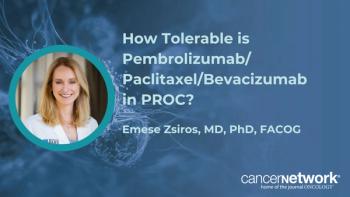
Multidisciplinary Care for Prostate Cancer ‘Should Always Happen’
The risk of radionuclide exposure to the public reflects one reason urologists need to collaborate with radiation oncologists when administering radiopharmaceuticals to patients with prostate cancer.
Scott T. Tagawa, MD, MS, FACP, highlighted that a limited number of urologists had radioactive licenses, thus necessitating collaboration with radiation oncologists in procedures including administration of prostate-specific membrane antigen (PSMA)-PET scans to patients with prostate cancer.
Tagawa, a professor of medicine and urology and medical director of the Genitourinary Oncology Research Program at Weill Cornell Medicine, spoke with CancerNetwork® about the importance of multidisciplinary care when it comes to administering radioactive therapy, at the
Transcript:
We need to practice multidisciplinary care. My bias is that it should always happen for every kind of disease stage and state, from stage I through stage IV. Clearly, with the kind of onslaught [that] I hope is coming with these radiopharmaceuticals, we know that the vast majority of patients with advanced cancer are in the hands of medical oncologists or, in the case of prostate cancer, urologists. Essentially, a small handful have radioactive licenses. So, we have to work hand-in-hand with either radiation oncology, nuclear medicine, or both. And especially for the theranostics, there’s a diagnostic component in terms of patient selection. And even though that PSMA-PET is a little bit easier to read than some of the other PET agents like fluciclovine, there’s still pitfalls that are there. We have to work closely with them.
In terms of administration of these compounds, it’s got to be with someone that has a license. So again, radiation oncology, nuclear medicine, or both. And then we still need to see the patients, because we’re the ones that have been handling the patients the longest, and are most equipped to handle the other parts of their disease, as well as ongoing [androgen deprivation therapy], for instance, or bone health that needs to keep going. The other aspect of these that’s different than most of our other drugs is the potential for exposure to others: household members, the general public, our staff. That’s something that’s a little bit different; all of our radionuclides have half-lives, so this is most important in the first couple of days following administration. That’s something that’s a little bit different than we have with other drugs, so it’s something that we just need to be mindful of.
Newsletter
Stay up to date on recent advances in the multidisciplinary approach to cancer.










































